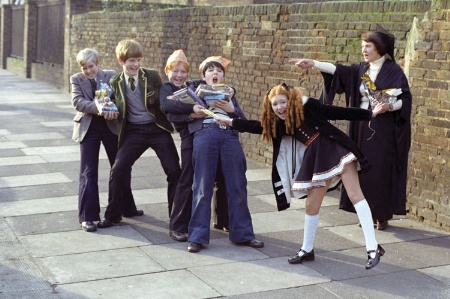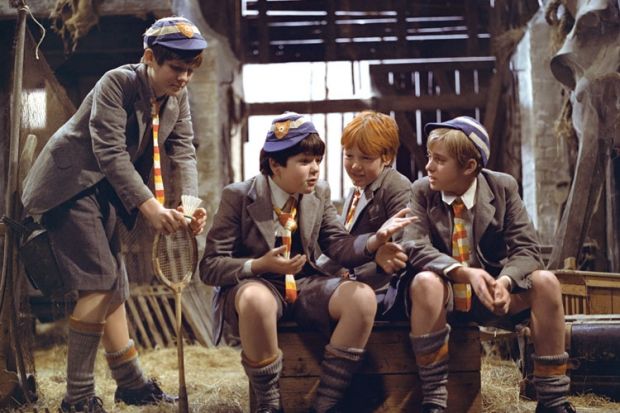Source: Rex Features
Forever young: William and his Outlaws plan an adventure in a 1970s TV adaptation of Crompton’s stories
Can you identify this female author from the following clues? She never married, she wrote about a very small section of society and had a quietly ironic style tinged with savagery. No, I’m not thinking of Jane Austen, but Richmal Crompton, the creator of the irrepressible William Brown, the 11-year-old hero of 38 collections of short stories.
The first appeared in 1922 and the last was published in 1970, one year after Crompton’s death. Translated into nine languages, the books have been adapted for stage, film, radio and television and are still in print today. William may not be the phenomenon that is Harry Potter, but the boy wizard has yet to show that he can last as long.
William is the youngest child of Mr and Mrs Brown. They live in a “modern” house in an unnamed village and have a cook and a housemaid. William has two elder siblings, Robert and Ethel, whose ages vary from 17 to 21. Robert has literary pretensions and inflicts his heartfelt verse on a new female each week. Ethel breaks a heart with each flick of her red hair and a trip to the village store can cause carnage among the local bachelors.
William looks upon his brother and sister with blank incomprehension. Their one redeeming feature is that they have items he would like to borrow, although domestic harmony is not well served by his often “forgetting” to ask before taking them. Robert and Ethel, different in so many respects, are united in their view of William as a curse fallen upon their house.
“Can’t you send him to an orphanage?” Ethel asks her mother on one occasion.
“But William isn’t an orphan, dear,” comes the infuriatingly reasonable and undeniably true reply.
Despite the trail of destruction and despair that William leaves in his wake, Mrs Brown retains her faith in his latent goodness. She keeps her head in a house where everyone else is losing theirs, especially Mr Brown, to whose eye William’s antics bring, at times, a near-murderous gleam. His son’s misdemeanours have made the family notorious, and a constant stream of neighbours complaining about their broken windows or muddy children deny him the quiet he so desperately seeks. His unspecified job in the City is his only sanctuary. Home and holidays are to him what the eagle was to Prometheus.
I don’t know how old I was when I first encountered William, probably about 8 or 9. I got the stories from the local library – remember those? – and they made me laugh. I didn’t know that books could do that. It was quite a revelation. I thought they dealt only with things like fractions and the Romans and the names of different kinds of rock.
William appealed to me because he was a boy of roughly my own age. As an only child, I was reassured to discover that there was someone else who was always in trouble and who had difficulty in keeping the dirt of life at bay.

The stories also make adults seem less threatening. They are presented in a humorous fashion and their flaws and little vanities made my own failures to be the perfect child more bearable. Like William, I was sometimes inspired to help my mother. I think she was grateful that these were fairly rare occasions. William’s efforts to improve the lives of his brother and sister are met with either dread or fury.
Robert accepts that William will spoil his life, but Ethel still struggles against the inevitability of fate. “You hateful boy,” she screams when she discovers that he has been matchmaking on her behalf with an elderly bachelor called Mr March. “I am going to tell Father.” A threat that prompts William to once again reflect on the essential unfairness of life. “I took a lot of trouble trying to get her married,” he says, “and this is how she pays me.”
William certainly brightened my boyhood. And although I should have put away childish things I still find myself, every now and again, picking up one of the collections. Why? Maybe it’s just further proof that men never grow up. Some part of them always remains a little boy. Yet that’s no bad thing, because one of the glories of childhood is its openness to the world. It is a time when we invent as much as discover what “lies about in our infancy”, to quote another famous William.
It is unlikely that Wordsworth would have seen William as an example of the innocence and holiness with which he endowed childhood, nor perhaps would William Blake. But Blake would have recognised William’s suffering at the hands of the adult world and both poets would hail him as an heir of Romanticism, if only because of his love of the outdoors and his capacious imagination. William and his faithful Outlaws, Ginger, Douglas and Henry, can transform a derelict house into a castle, a meadow into a jungle or a gardener into an evil giant.
But I don’t think it’s William’s literary lineage that particularly appeals to me, nor is it necessarily his rebelliousness and resilience. I think it’s just that the tales are so beautifully crafted. Each one has a strong storyline, lively characterisation, satire, slapstick and more than a pinch of philosophy. William understands perfectly well that our beginnings never know our ends. “I never meant to do it” is one of his favourite refrains. Which makes it all the more puzzling that, as far as I know, the little scamp does not appear on reading lists for courses on children’s literature.
The stories were also periodically banned from the 1960s onwards by some schools and libraries because they were deemed too middle class. The majority of children, it was argued, would not be able to identify with William’s world and, besides, the hierarchical nature of his society and the attitudes that went with it were out of step with modern democratic Britain. It’s true that Crompton herself was a lifelong Conservative and member of the Church of England, but William can hardly be seen as an apologist for the status quo.
It is through his eyes that we see the pretensions, hypocrisy and snobbery of English society between the wars. At one point we are told that he does not like facts, being tied down to detail and answering questions. “As a politician,” Crompton adds, “a great future would have lain before him.” The stories are full of such wit, and their social observations make them a good source of information about the period, particularly about class and gender. But it is Crompton’s style that makes them truly outstanding. She is the most accomplished writer of children’s fiction in the 20th century, not least because she had an intuitive grasp of their psychology.
Mary Cadogan, in her wonderful 1986 biography Richmal Crompton: The Woman behind William, says that she was “a great one for ceremonial leave-takings, rather in the Jane Austen tradition of putting the departing guests into carriages”. Well, Crompton’s carriage has long disappeared from view but, like Austen, she has left us something of herself. Unlike Austen, however, she is yet to be embraced by the critical establishment. It is time that she was.
Register to continue
Why register?
- Registration is free and only takes a moment
- Once registered, you can read 3 articles a month
- Sign up for our newsletter
Subscribe
Or subscribe for unlimited access to:
- Unlimited access to news, views, insights & reviews
- Digital editions
- Digital access to THE’s university and college rankings analysis
Already registered or a current subscriber? Login
